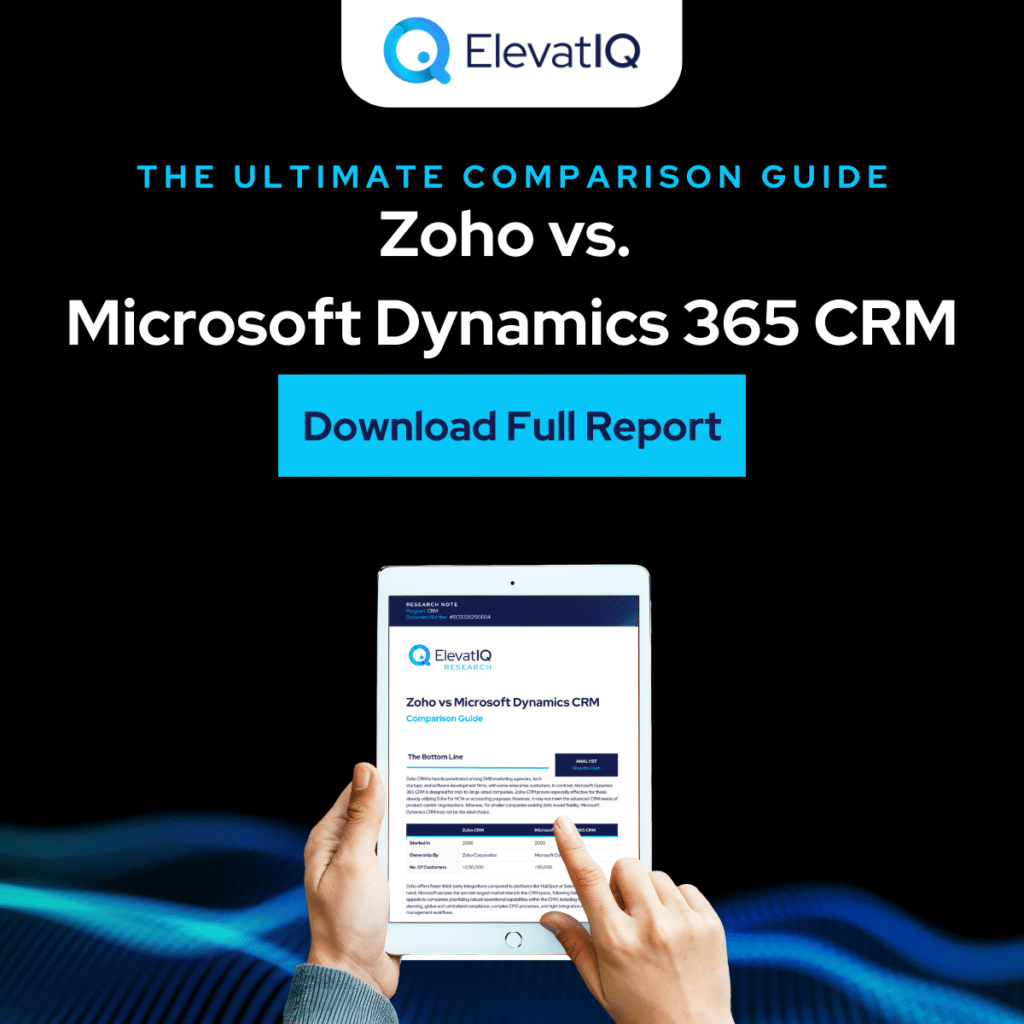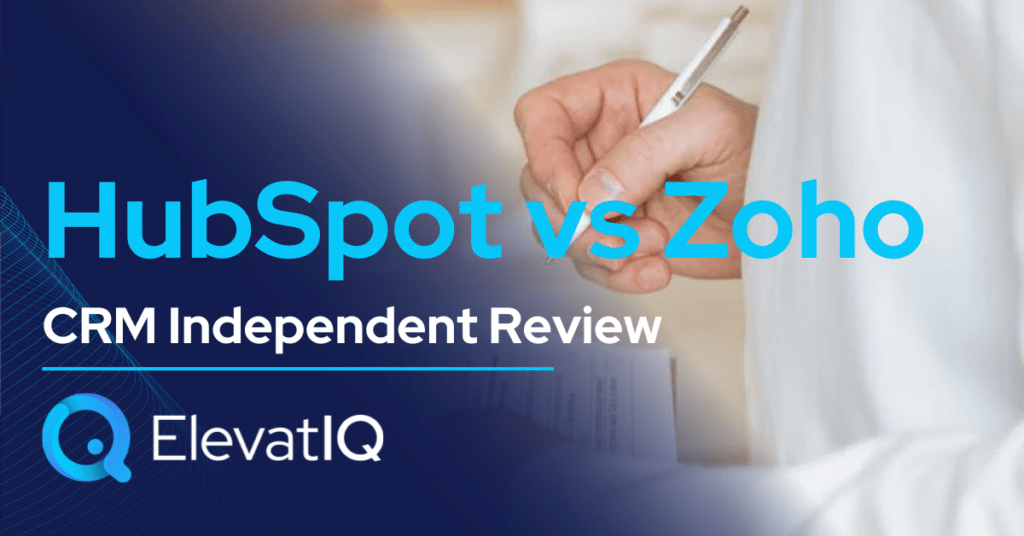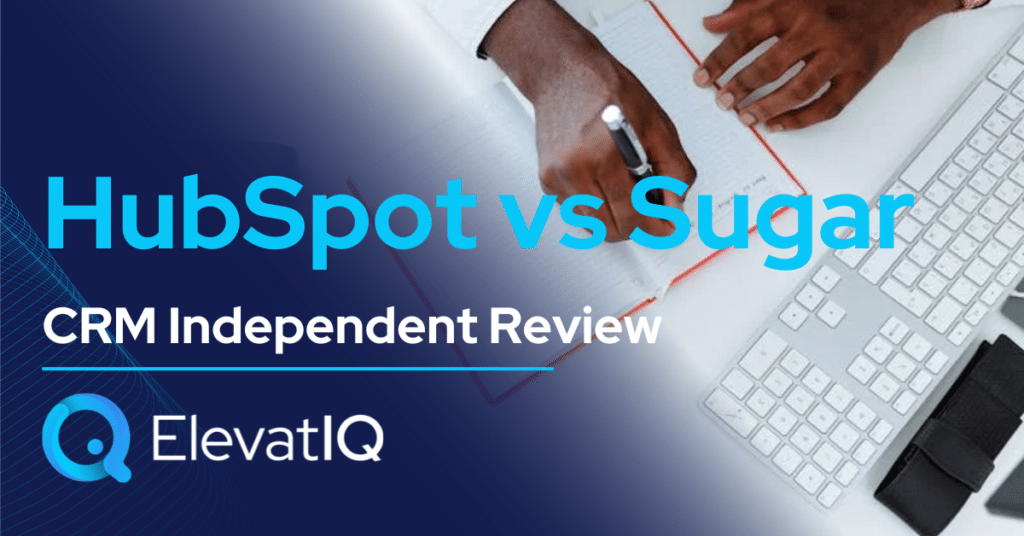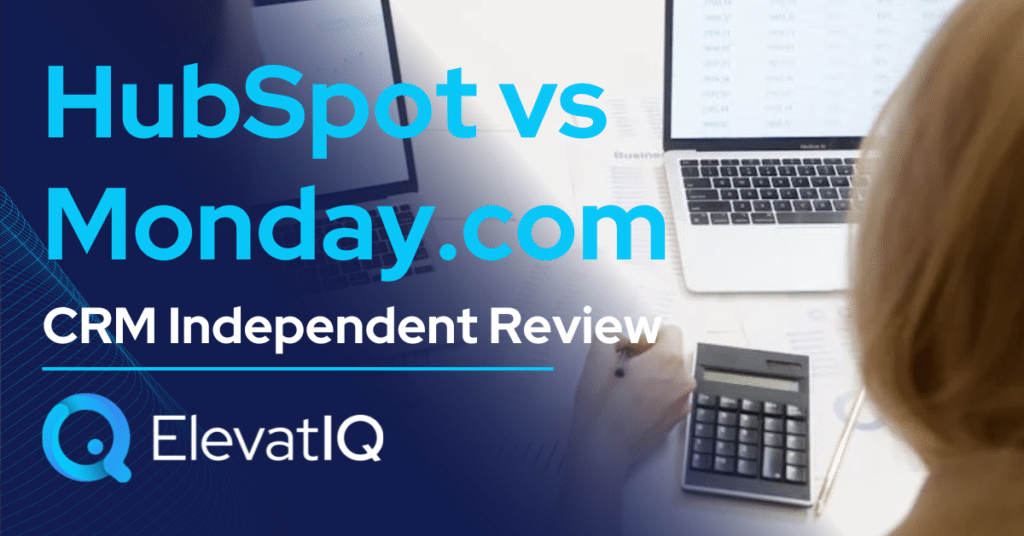Last Updated on April 13, 2025 by Sam Gupta
HubSpot CRM, compared to Salesforce, has a somewhat simpler data and process model, making it a better fit for SMBs focused on content-centric marketing workflows. On the other hand, Zoho CRM is tailored for smaller professional services companies like marketing agencies, tech startups, and software development firms. HubSpot, in particular, is designed with a focus on upstream marketing activities, offering a stronger ecosystem, but it may not be the best fit for companies with complex audiences or transactional customer-facing workflows.
Whereas, Zoho CRM proves especially effective for those already utilizing Zoho for HCM or accounting purposes. However, it may not meet the advanced CRM needs of product-centric organizations. HubSpot excels in user-friendliness and customization, even though it may not match the depth of customer and field service workflows or provide as many built-in custom objects for specific industries. On the other hand, Zoho excels within its app portfolio, it offers fewer third-party integrations compared to platforms like HubSpot or Salesforce. To better understand these two CRM systems, let’s take an in-depth look into their features, strengths and also weaknesses.
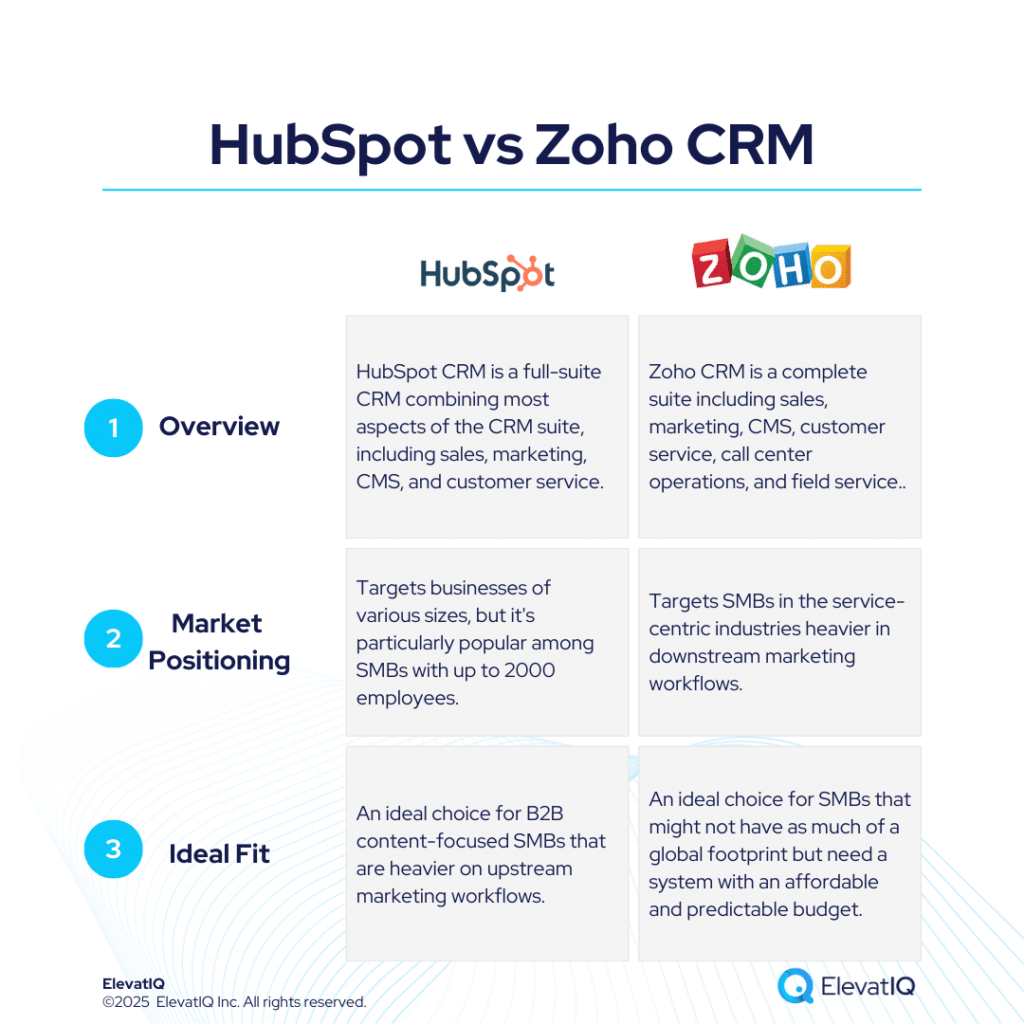

| HubSpot CRM | Zoho CRM | |
| Started in | 2006 | 2006 |
| Ownership by | HubSpot Inc. | Zoho Corporation |
| No. of customers | >70,000 | >2,50,000 |
What Is HubSpot CRM?
HubSpot CRM is a leading choice for smaller companies aiming for seamless integration of customer-centric workflows, covering essential CRM processes such as sales, service, CMS, and marketing automation. In contrast to Salesforce, HubSpot excels in user-friendliness and customization, even though it may not match the depth of customer and field service workflows or provide as many built-in custom objects for specific industries.
However, this adaptability might pose challenges for companies unfamiliar with robust data and process governance. HubSpot CRM proves advantageous, especially for content-heavy B2B companies aiming for centralized management of digital marketing and sales channels. The recent acquisition of Clearbit further enhances HubSpot’s capabilities by integrating data and intelligence with core CRM processes, solidifying its position in the market.

What Is Zoho CRM?
Zoho CRM is tailored particularly for smaller professional services companies like marketing agencies, tech startups, and software development firms. It proves especially effective for those already utilizing Zoho for HCM or accounting purposes. However, it may not meet the advanced CRM needs of product-centric organizations.
HubSpot vs Zoho CRM Comparison
Navigating the choice between HubSpot vs Zoho CRM is a significant decision for businesses particularly looking for operational efficiency and strategic alignment. Thus, this section delves into the comprehensive comparison of HubSpot vs Zoho CRM across various critical dimensions.
| HubSpot CRM | Zoho CRM | |
| Data Model | Isn’t well-suited for complex operational use cases. | Data model mirrors Salesforce’s. |
| CRM Features | It may not suit companies with deeper compliance, regulatory, and quoting needs. | May not be suitable for large companies with regulatory, compliance, or planning needs. |
| Ecosystem | The second choice for most leading marketing technologies to integrate with. | Has a closed ecosystem compared to HubSpot. |
| Marketing Automation | Provides an immersive experience as it’s part of the same product and data model. | Core marketing automation features are not as strong. |
| Integration | Provides options for seamless integration with other CRM systems, CMS platforms, and eCommerce tools. | Excels in integrating with other Zoho applications. |
| Operational Capabilities | The operational capabilities are not as detailed as some of the other CRM systems. | Stronger operational capabilities with capabilities to customize. |
| Territory and Comp Planning | The weaker data model makes it less suitable for industries requiring robust out-of-the-box capabilities. | Offers significant capabilities. However, its less integrated data model may pose challenges. |
| Customizability | Custom objects come with significant limitations, particularly around parent-child hierarchies. | This design choice aims to keep the platform simple, it may pose challenges if extensive customization is a priority. |
| Price | Offers a free version, but the price spikes substantially with tricky limits and tiers, making estimating prices highly challenging. | Has one price model for the entire suite, but with # of emails and contacts, the price would increase, but it might not be as steep as systems such as HubSpot. |
HubSpot vs Zoho CRM Module Comparison
Both platforms offer a plethora of features and functionalities designed to streamline business operations and enhance efficiency. In this feature comparison, we delve into particularly the distinct capabilities of HubSpot vs Zoho CRM across various critical dimensions, providing insights to aid businesses in making informed decisions regarding their CRM selection. Thus, this section discusses features under each of the following modules, particularly marketing, sales, customer service and e-commerce.

Marketing
In this section, we are discussing a detailed comparison of the marketing capabilities particularly offered by HubSpot vs Zoho CRM. By examining their respective strengths and functionalities, particularly in managing marketing processes. Businesses can therefore gain valuable insights to determine the best-suited CRM solution for their marketing needs.
| Features | HubSpot CRM | Zoho CRM |
| Content Creation | Offers tools for creating blog posts, landing pages, and also marketing emails. | Zoho CRM doesn’t have a dedicated content creation module particularly like HubSpot, but it does offer tools that support content creation within its ecosystem like Zoho Writer, PageSense, Sites, Show, and Docs. |
| SEO Tools | Includes built-in SEO recommendations and also optimization features. | Tools to optimize website content, meta tags, and also page loading speed for better search engine rankings. |
| Social Media Management | Allows scheduling, publishing, and also monitoring of social media posts. | Powered by Zoho Social, allows you to create, share, and monitor content across multiple social media platforms particularly like Twitter, Instagram, Facebook, LinkedIn, Google My Business, and YouTube |
| Email Marketing | Includes email marketing tools with templates, automation, and also analytics. | Powered by Zoho Campaigns, offers a comprehensive suite of tools to create, send, and also track targeted email campaigns |
Sales
In this comparison, we explore and analyze the sales capabilities of HubSpot vs Zoho CRM, shedding light particularly on their respective strengths and weaknesses.
| Features | HubSpot CRM | Zoho CRM |
| Lead Management | Manages leads with tracking and nurturing tools. | Helps businesses capture, nurture, and convert leads efficiently. |
| Sales Pipeline Management | Visualizes and also tracks sales pipeline stages and progress. | Provides a visual representation of your sales process and also helps track deals through various stages. |
| Email Tracking | Tracks email opens, clicks, and also responses. | Provides insights into how your emails are performing along with pre-designed templates. |
| Meeting Scheduling | Integrates with calendars for easy scheduling of meetings. | Helps you manage and schedule meetings seamlessly with integrated calendar, reminders, etc. |
| Collaboration Tools | Facilitates team collaboration with shared information and tasks. | Built-in chat functionality for real-time communication. |
Customer Service
In this comparison, we explore and analyze the customer service capabilities of HubSpot vs Zoho CRM, shedding light particularly on their respective strengths and weaknesses.
| Features | HubSpot CRM | Zoho CRM |
| Ticket System | Offers a support ticketing system for customer inquiries. | Efficiently manages ticket creation along with tracking and SLA management. |
| Live Chat | Provides live chat support for customer interactions. | Through Zoho Desk and Zoho SalesIQ, particularly enabling real-time communication with customers. |
| Customer Support Automation | Automates customer support processes and workflows. | Helps streamline support processes with automated workflows, escalation rules, and predefined response templates. |
| Omni-channel Support | Supports multiple channels like email, chat, and also social media. | Allows businesses to manage customer interactions across multiple channels. |
E-commerce
In this comparison, we explore and analyze the e-commerce capabilities of HubSpot vs Zoho CRM, shedding light particularly on their respective strengths and weaknesses.
| Features | HubSpot CRM | Zoho CRM |
| Product Catalog Management | Manages product listings and also descriptions. | Allows you to create and manage a digital product catalog. |
| Order Fulfillment | Tracks and manages order processing and fulfillment. | Zoho Inventory helps manage inventory, warehouse operations, and order processing. |
| Personalized Shopping Experiences | Customizes shopping experiences particularly based on customer behavior. | Zoho CRM can be integrated with other Zoho applications to provide personalized shopping experiences. |
HubSpot vs Zoho CRM Pros
When evaluating CRM solutions, understanding the distinct advantages of HubSpot vs Zoho CRM is crucial. In this section, we are particularly exploring the strengths of HubSpot vs Zoho CRM across various dimensions. Thus, shedding light on their respective capabilities and functionalities.
| HubSpot CRM | Zoho CRM |
| Stronger with upstream marketing and also content-driven workflows. | Includes a pre-packaged workflow builder, allowing teams with development expertise to construct intricate workflows. |
| Has strong workflows and also custom-coded actions. | The inclusion of Zoho Creator enables developers to swiftly integrate other software and create custom apps without relying on additional third-party tools. |
| Offers consolidated platform that siloed apps. | Great capabilities with sales comp and territory planning. |
| Offering fairly detailed custom objects. | Provides a complete integrated stack for CPQ processes. |
HubSpot vs Zoho CRM Cons
Just like recognizing strengths is important, it’s also crucial to weigh the specific drawbacks of HubSpot vs Zoho CRM. Therefore, in this section, we will delve into the limitations and challenges associated with HubSpot vs Zoho CRM across various operational and financial dimensions.
| HubSpot CRM | Zoho CRM |
| Not fit for ad-hoc flows. | Lacks robust support for territory management and sales team planning. |
| Overall expensive, also tiers are tricky to work with. | Integration options outside Zoho are limited. |
| The data model is rigid and also weak for B2B businesses. | It’s a slightly more closed ecosystem compared to HubSpot. |
| It may not suit companies particularly with deeper compliance, regulatory, and quoting needs. | It might require consulting help, just because of the complexity of its data model as well as process model. |
Conclusion
In conclusion, the choice between HubSpot vs Zoho CRM ultimately depends on the specific needs and priorities of your business. HubSpot CRM stands out for its user-friendly interface, seamless integration of upstream marketing workflows, and also robust content creation tools, making it an excellent choice for B2B SMBs focused on content-driven strategies. However, it comes with limitations in handling complex operational and regulatory requirements, along with potentially high costs.
On the other hand, Zoho CRM is well-suited for smaller professional services firms and businesses already integrated into Zoho’s ecosystem. It offers strong customization capabilities, effective internal app integration, and a wide range of features, but its relatively closed ecosystem and challenges in third-party integrations might be a drawback for some businesses. Both systems have their strengths and limitations, so businesses should carefully evaluate their specific need. Also, seeking assistance from an independent CRM consultant can significantly aid the decision-making process.
